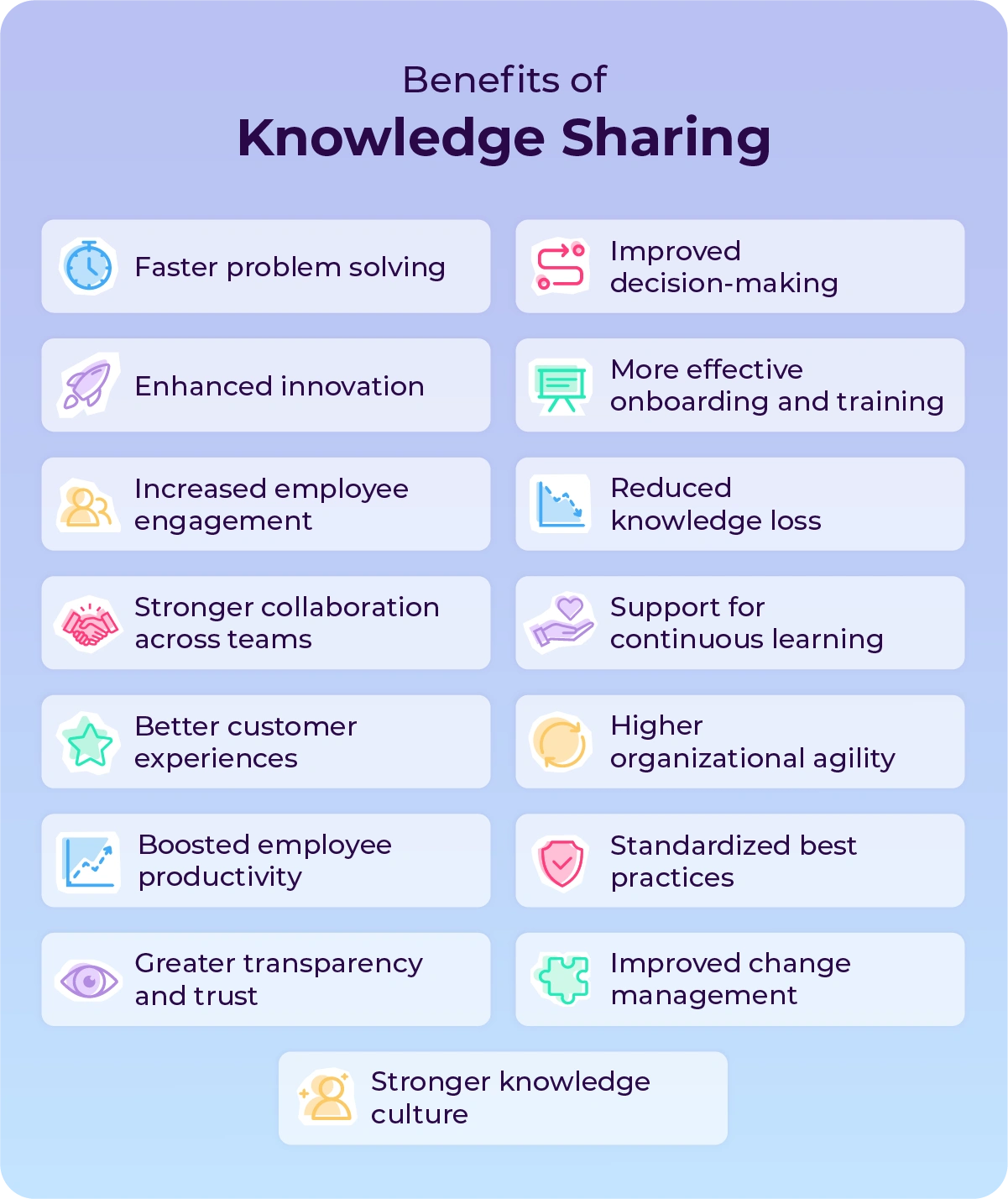An information-driven world means organizations are sitting on one of their most valuable assets—knowledge. Yet, this resource often remains untapped, siloed in departments or individuals’ minds. Enter knowledge sharing: the process of exchanging information, skills, and expertise across teams, roles, and hierarchies. When done effectively, knowledge sharing drives innovation, boosts productivity, enhances collaboration, secures a company’s long-term success, and more.
In this blog, we’ll explore what knowledge sharing really means, why it matters more than ever, and the transformative benefits it brings to individuals, teams, and organizations.
What is knowledge sharing?
Knowledge sharing is the process of exchanging information, skills, and expertise across individuals, teams, or entire organizations. It involves making both explicit knowledge (like documents, procedures, and data) and tacit knowledge (such as personal insights or experience-based know-how) accessible to others who can benefit from it.
This exchange can happen formally—through training programs, knowledge bases, and documentation—or informally, through conversations, mentorship, and collaboration. The goal is to ensure that valuable knowledge doesn't stay locked in silos or individuals' heads, but instead flows freely to support learning, innovation, and performance.
Why Is knowledge sharing important?
Knowledge sharing is critical because it transforms individual know-how into collective organizational intelligence. In today’s fast-moving business environment, where employees often work across departments, time zones, and technologies, the ability to quickly access and apply shared knowledge can mean the difference between success and stagnation. Without effective knowledge sharing, organizations risk creating silos, duplicating efforts, and making decisions based on incomplete information.
Knowledge sharing helps future-proof the organization. When employees leave, retire, or change roles, they often take valuable expertise with them. By capturing and distributing that knowledge, companies retain institutional memory and reduce disruption.
Top benefits of knowledge sharing
Now that we understand what knowledge sharing is and why it matters, let’s explore the many ways it can positively impact your organization.

1. Faster problem solving
Knowledge sharing significantly reduces the time spent reinventing the wheel. When employees have access to solutions that have already been tested or documented by others, they can resolve issues more efficiently. This leads to quicker turnaround times, fewer errors, and improved productivity. Whether it's a technical fix, a client objection, or a process bottleneck, shared knowledge enables faster, smarter responses.
2. Improved decision-making
Better decisions are made when more perspectives are considered. By sharing insights across departments and roles, organizations tap into collective experience and reduce blind spots. This helps teams anticipate risks, evaluate options more comprehensively, and make choices based on a fuller picture of available data. Informed decisions are typically more strategic, defensible, and aligned with company goals.
3. Enhanced innovation
Innovation thrives when knowledge flows freely. Organizations with effective knowledge-sharing are 3x more likely to be innovation leaders. Sharing ideas, lessons learned, and experiences allows employees to build on each other's thinking and generate creative solutions. The mass of insights from different functions or backgrounds often leads to breakthroughs that wouldn’t emerge in isolation. A culture of knowledge sharing fuels experimentation, continuous improvement, and game-changing innovations.
4. More effective onboarding and training
When knowledge is documented and accessible, new hires can get up to speed much faster. Instead of relying solely on one-on-one training, they can explore guides, process maps, and recorded tutorials. This accelerates their learning curve, boosts confidence, and ensures they’re equipped to contribute quickly. Shared knowledge also creates consistency in how employees are trained.
5. Increased employee engagement
Employees who are encouraged to share what they know feel more valued and recognized. It reinforces a sense of purpose, ownership, and community. In fact, organizations with knowledge-sharing practices see a 20% increase in employee engagement. Contributing to the organization’s success through shared expertise can boost morale and foster stronger connections among coworkers. This engagement, in turn, leads to greater loyalty, collaboration, and a more vibrant organizational culture.
6. Reduced knowledge loss
When experienced employees leave without passing on their knowledge, the organization suffers. Critical know-how walks out the door, potentially affecting operations, continuity, and service quality. By regularly documenting and sharing knowledge, companies preserve institutional memory and reduce their reliance on specific individuals. This makes teams more resilient to turnover and better prepared for the future.
7. Stronger collaboration across teams
Siloed teams often duplicate work or miss out on opportunities for synergy. Knowledge sharing encourages cross-functional communication and alignment. When departments share goals, best practices, and lessons learned, collaboration becomes more effective and less fragmented. This promotes mutual understanding, reduces friction, and ensures that every team is working toward the same objectives with shared context.
8. Support for continuous learning
A knowledge-sharing culture encourages employees to stay curious and continuously improve. When people see that learning is valued—and that their learning benefits others—they’re more likely to seek out new skills and insights. Organizations that support ongoing development tend to be more adaptable, competitive, and attractive to top talent who want to grow professionally.
9. Better customer experiences
Customers notice when they’re dealing with well-informed, confident representatives. Knowledge sharing ensures frontline employees have immediate access to accurate information and guidance. This reduces wait times, increases first-call resolution rates, and fosters trust. Whether it's a service interaction or a product inquiry, consistent, high-quality support leads to better customer satisfaction and loyalty.
10. Higher organizational agility
Agility is the ability to respond quickly to changing conditions, and knowledge sharing plays a critical role in making that possible. When knowledge is centralized and accessible, teams can adjust strategies, shift resources, and adopt new tools more effectively. This agility allows companies to stay competitive, recover from disruptions, and seize new opportunities with confidence.
11. Boosted employee productivity
When employees can quickly access relevant information and best practices, they spend less time searching for answers or duplicating work. And if employees can efficiently find and use the knowledge available to them, organizations can save employees up to eight weeks of productivity a year. This leads to more efficient workflows, fewer interruptions, and increased focus on high-value tasks. Productivity improves across the board as teams leverage existing knowledge instead of starting from scratch, enabling them to deliver results faster and with greater accuracy.
12. Standardized best practices
Knowledge sharing helps establish and maintain consistency in how tasks and processes are executed. When best practices are documented and distributed, teams can align on methods that have proven successful. This minimizes errors, ensures quality, and creates repeatable standards across departments or locations—especially valuable in industries like healthcare, manufacturing, and finance where compliance and accuracy are critical.
13. Greater transparency and trust
Sharing knowledge openly builds a culture of transparency where employees understand the “why” behind decisions and strategies. This openness fosters trust in leadership and between teams, reducing rumors, misunderstandings, and resistance to change. When people feel informed and in the loop, they’re more likely to collaborate, offer feedback, and engage in honest, productive dialogue.
14. Improved change management
Organizational change—whether it’s a new system, policy, or business model—often fails due to poor communication and lack of understanding. Knowledge sharing smooths transitions by clarifying expectations, reducing confusion, and preparing employees for what’s ahead. It helps embed new practices through training, documentation, and peer support, accelerating adoption and reducing resistance to change.
15. Stronger knowledge culture
The act of sharing knowledge reinforces a culture where learning, teaching, and collaboration are deeply embedded in daily work. Over time, this creates a self-sustaining environment where employees proactively document insights, ask questions, and contribute to collective success. A strong knowledge culture becomes a competitive advantage, helping organizations attract talent, retain expertise, and adapt over the long term.
Get started with knowledge sharing in your organization
In a world where change is constant and information is abundant, those who learn and share knowledge best will lead the way. By empowering employees to share what they know, organizations become more agile, innovative, and resilient. The benefits span every level, from individual growth to organizational success.
Visit our features page to learn more about how knowledge sharing creates a more connected, informed, and empowered workforce.



